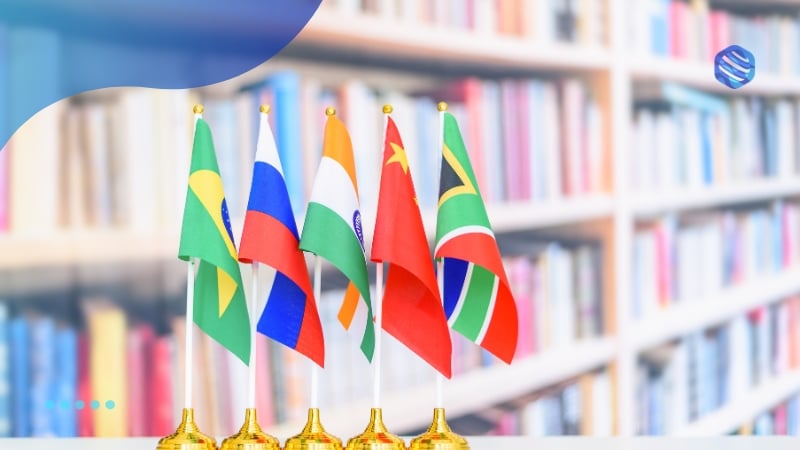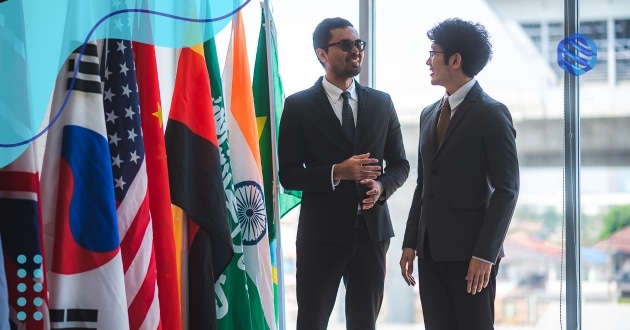South Africa international relations news 2025 is rapidly evolving, highlighting key developments that mark the country’s growing global influence.
From strengthening BRICS partnerships to new trade agreements and peacekeeping missions, South Africa is playing an increasingly proactive role on the world stage.
This article dives into the latest updates, future outlook, and what these changes mean for the region and the world.
Strengthening Alliances: BRICS and Beyond
To begin with, one of the most notable developments in South Africa international relations news 2025 is the nation’s active participation in the expanded BRICS+ bloc. The inclusion of new member states such as Egypt, Saudi Arabia, and Argentina has transformed BRICS into a more powerful geopolitical and economic force.
Moreover, South Africa has positioned itself as a key mediator and voice for the Global South, advocating for fair trade, climate justice, and economic reform on a global level.
What is BRICS?

BRICS is an acronym that refers to a group of five major emerging economies: Brazil, Russia, India, China, and South Africa. Originally coined as “BRIC” in 2001 by economist Jim O’Neill, the bloc formally became BRICS in 2010 when South Africa joined the alliance. Over time, it has evolved into a powerful geopolitical and economic force that represents more than 40% of the global population and approximately 25% of the world’s GDP.
The BRICS alliance is built on principles of mutual cooperation, inclusive development, and multipolarity in global governance. Unlike traditional Western-led institutions, BRICS promotes a more equitable and representative international system, giving a stronger voice to developing nations.
Key focus areas of BRICS include:
- Economic cooperation and trade facilitation
- Political dialogue and global security issues
- Sustainable development and climate action
- Innovation, digital economy, and infrastructure funding
In recent years, BRICS has expanded its influence by launching the New Development Bank (NDB), establishing a Contingent Reserve Arrangement (CRA) for financial stability, and hosting annual summits to align strategies among member nations.
In 2025, with the addition of new prospective members through the BRICS+ framework, the bloc is positioning itself as a formidable alternative to Western-centric organizations like the G7. For South Africa, BRICS provides a platform to advocate for African priorities and amplify its role in shaping global policies.
Recent Diplomatic Engagements
Throughout the first quarter of 2025, South African diplomats have engaged in over 20 high-level international meetings. These include summits with the African Union, European Union, and ASEAN.
Below is a summary of major diplomatic highlights:
| Date | Event | Key Outcome |
|---|---|---|
| Jan 2025 | AU Summit, Addis Ababa | Commitment to Pan-African free trade acceleration |
| Feb 2025 | BRICS+ Leaders Forum, São Paulo | New funding for green infrastructure projects |
| Mar 2025 | EU-South Africa Strategic Dialogue | Renewal of €2.5B trade and development cooperation |
| Mar 2025 | ASEAN-SADC Virtual Roundtable | Joint initiative on digital transformation in Africa |
These events not only reinforce South Africa’s strategic international role, but also attract significant foreign investment and technological exchange.
Economic Diplomacy and Trade Expansion

Equally important, South Africa international relations news 2025 includes several trade expansion initiatives. The country has signed bilateral agreements with Vietnam, Canada, and the UAE, focusing on the export of minerals, renewable energy technologies, and agricultural products.
As a result, the Department of Trade and Industry estimates a projected $8.6 billion boost in foreign trade revenue by the end of 2025.
Peacekeeping and Humanitarian Efforts
On another front, South Africa continues to play a stabilizing role in regional peacekeeping missions. In 2025, the nation committed additional troops and medical aid to ongoing UN operations in the Democratic Republic of Congo and Sudan.
Notably, South African-led negotiation efforts have also helped reduce tensions between Rwanda and the DRC, a move praised by the United Nations and African Union alike.
Challenges and Strategic Risks
Despite the positive trajectory, there are several challenges to monitor:
- Increasing tensions in the Middle East affecting global supply chains
- The volatility of the Rand impacting long-term agreements
- Domestic political shifts influencing foreign policy priorities
Even so, South Africa remains committed to multilateralism and global cooperation, reinforcing its position as a leader among emerging economies.
Conclusion: A Defining Year in Foreign Policy
In conclusion, South Africa international relations news 2025 highlights a pivotal year in the country’s foreign policy evolution. The government’s proactive approach to diplomacy, combined with strategic economic partnerships and increased participation in multilateral platforms, underscores a clear vision: South Africa is no longer just a regional player, it is an emerging global influencer.
What makes 2025 particularly significant is the balanced and multifaceted strategy South Africa has adopted. On one hand, it continues to champion African unity and regional integration, aligning closely with the goals of the African Continental Free Trade Area (AfCFTA). On the other, it is also expanding its global footprint by forging partnerships across the Americas, Europe, Asia, and the Middle East.
Furthermore, the government’s emphasis on climate diplomacy, digital innovation, and inclusive economic growth aligns South Africa with the priorities of the modern international agenda. By advocating for climate financing, fair trade reforms, and global south solidarity, South Africa is shaping global conversations that go beyond its immediate borders.
However, with greater influence comes greater responsibility. To sustain its growing role, South Africa will need to ensure internal political stability, invest in institutional capacity, and maintain transparency in its international dealings. There is also the crucial task of turning diplomatic wins into long-term socio-economic benefits for its citizens.
Ultimately, 2025 may be remembered as the year when South Africa transitioned from a responsive actor to a proactive architect of international relations. The steps taken this year could redefine its diplomatic legacy for decades to come, placing it firmly on the path to becoming one of the most respected and strategic voices in the global south.
Frequently Asked Questions (FAQ)
1. What are the main goals of South Africa international relations?
South Africa international relations focus on promoting regional stability, economic development, and global cooperation. The country aims to strengthen ties within Africa while also expanding partnerships with global powers to address challenges like climate change, inequality, and trade imbalances.
2. How does South Africa benefit from being part of BRICS?
Being part of BRICS allows South Africa to access development funding, increase trade opportunities, and collaborate on global policy issues. It also gives the country a platform to represent the interests of the African continent in a powerful multilateral group.
3. What role does South Africa play in African diplomacy?
South Africa international relations play a central role in African diplomacy, especially through its leadership in the African Union and peacekeeping efforts. The country often acts as a mediator in regional conflicts and advocates for deeper continental integration.
4. Has South Africa signed new trade agreements in 2025?
Yes. In 2025, South Africa signed several new trade deals with countries like Vietnam, Canada, and the UAE. These agreements focus on key sectors such as energy, agriculture, and technology, further strengthening South Africa international relations.
5. What challenges affect South Africa’s foreign policy?
Despite progress, South Africa international relations face challenges like currency volatility, domestic political shifts, and geopolitical tensions abroad. However, the country continues to prioritize diplomacy, economic reform, and multilateral cooperation to overcome these hurdles.


